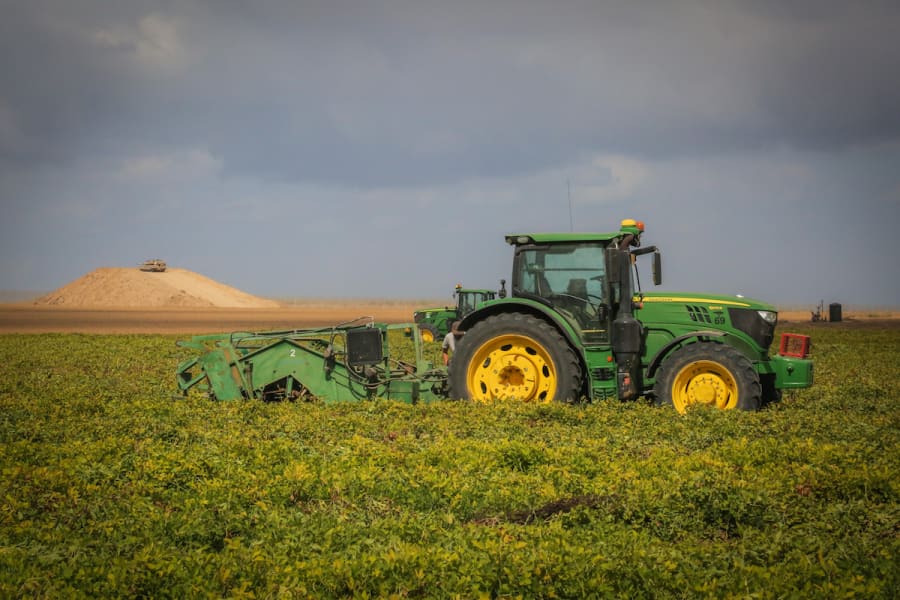Israeli farmers facing existential crisis as foreign workers leave country following Oct. 7 Hamas massacre

Following the Oct. 7 massacre, in which the Hamas terror organization brutally killed 1,200 people and kidnapped more than 240 hostages in Gaza, some 10,000 foreign workers have left the Jewish state.
The departure of these agricultural workers, who present about one-third of Israel’s total foreign workforce, was triggered by the fear of falling victim to more terrorist attacks. Dozens of foreign workers, mostly agricultural workers from Thailand, were killed by Hamas during the massacre and others hostage.
The exit of the foreign agricultural workers has triggered the worst manpower crisis in the sector in all of Israel’s history, according to Israeli Agriculture Ministry Dir-Gen. Oren Lavi.
There is currently a shortage of some 40,000 farm laborers, according to data presented on Nov. 15 by the Agriculture Ministry to a Knesset subcommittee on economic growth.
Many believe this is more than a manpower crisis, however.
For the Jewish state, it has become an existential crisis for Israeli farmers, with crops rotting in the fields and cows that need milking several times a day.
Although Israelis have stepped up to volunteer and help, it will not be enough without the prospect of foreign workers returning.
Aside from the departure of foreign workers, many Israeli citizens who work in agriculture have been called up for military reserve duty and are serving in Gaza or in the north, while Palestinian agricultural workers, for security reasons, cannot be allowed into Israel from Gaza or Judea and Samaria.
A 2021 Knesset study of 75,200 people working in the agriculture sector in 2020 revealed that 49% were Israeli, 32% foreign – mostly Thai – and 19% were Palestinian.
One farmer, Eli Pereg, whose farm is close to Israel's southern border with Gaza, explained that he had lost most of his crops since Oct. 7
“I’ve lost 80% of my crops in this mess,” Pereg said. “And I don’t know how I will continue from here.” Twelve of Pereg’s farm workers returned to Thailand, following pleas from the Thai government, which paid for the evacuations.
“Pictures circulating on social media of Gazans beheading a Thai man with garden hoes scared most of my workers,” said Pereg. “The two who stayed have been with me the longest and are used to wars.”
Israel’s Gaza border region is one of Israel’s most agriculturally productive areas, but following the massacre, the Israeli military evacuated the region and shortages became apparent, as farmers were not allowed to return to their fields for a week. Produce, such as tomatoes and cucumbers, have tripled in price and supermarkets have chosen to sign import contracts with mainly Turkish agricultural exporters, thereby leaving Israeli farmers to fend for themselves.
“The big chains didn’t want to look in our direction,” said Shlomo Yifrah, who owns 50 hectares (123 acres) of fields in Tirosh, located between Beit Shemesh and Kiryat Malachi, 40 km (25 miles) from Gaza.
“They only care about their pockets,” said Yifrah, who lost 27 of the 30 Thai workers despite the distance between his farm and Gaza. Even with volunteers, he only managed to save a small percentage of his crop.
“Thanks to volunteers, we managed to save 20% of the produce. We were able to sell to small grocery stores,” he said.
Although several volunteer initiatives have been started to organize volunteers to work at the ailing farms, it is not enough. Volunteers, such as Taglit-Birthright alumni in North America who came to Israel to help, can help pick the harvest, but farmers still need skilled workers to plant new crops.
“I just don’t have the workers I need to plant another crop,” Yifrah said, adding that he feels abandoned by everyone.
“My workers left, the supermarket chains imported from Turkey, and we still don’t know if the government is going to help us,” he said. “My only consolation is the volunteers.”
The Knesset has yet to vote on and approve a framework for compensating farmers for their losses, which was agreed upon by the Agriculture and Finance ministries together with the Knesset Finance Committee and the Israeli Farmers’ Association at the Nov. 15 meeting.
Full compensation will be provided to farms within 9 km (5.5 miles) of the Lebanon border, or 7 km (4.3 miles) from the Gaza border, while a maximum of NIS 3 million ($780,000) in damages per month will be provided to farms located up to 20 km(12.4 miles) from either border.

The All Israel News Staff is a team of journalists in Israel.














